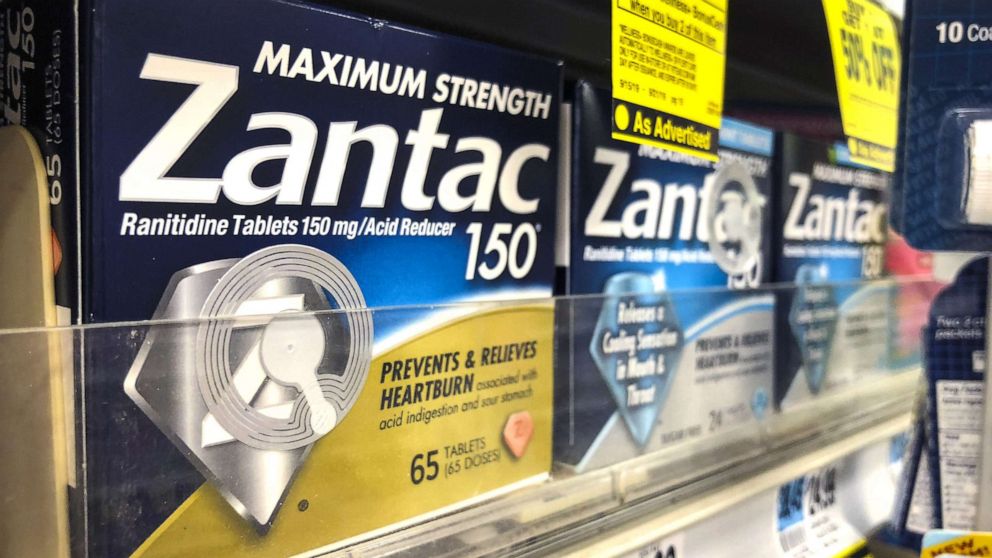What's The Deal With Zantac?
- Manufacturers and big pharmacies are recalling Zantac after the FDA announced it was investigating low-levels of cancer-causing chemicals in the popular heartburn drug
- There are other drugs that work similarly to Zantac and are safe alternatives, including Pepcid and Tagamet
- Experts say that if you’ve been taking Zantac, it’s likely that you don’t have to worry; they have yet to see any serious side effects over many years

10 Things to Know About Zantac — And How to Get Rid of Your Heartburn
- Experts, including one of the country's leading heartburn specialists, Dr. Jamie Koufman of the Voice Institute of New York, say there's little reason to worry. "In all my years treating patients, I have yet to see major side effects from Zantac," Dr. Koufman said. "But I'm not recommending (Zantac) at this time until all the data comes in [to the FDA]."
- The generic drug name for Zantac is "ranitidine." A lot of different companies sell it under various names, such as Walgreens' generic version, which is called "Wal-Zan.”
- Zantac is a type of drug called an "H2 blocker," which helps the stomach stop producing as much acid. Pepcid and Tagamet work the same way.
- Luckily, Zantac isn't the only effective heartburn drug out there. "The public should know that there are alternatives to Zantac," Dr. Iris Udasin, medical director of the Environmental and Occupational Health Sciences Institute’s Clinical Center at the Rutgers School of Public Health said. "People can opt for the good alternative Pepcid (generic name Famotidine) to relieve heartburn or other issues of indigestion." People who regularly took Zantac before all of this should be able to easily switch to alternatives such as Pepcid, or to another alternative, Tagamet (generic name cimetidine). Both are available both over the counter and work essentially the same way and with the same efficacy as Zantac, but without the cancer-causing chemical risk.
- The concerning chemical found in Zantac, NDMA, is classified as a "probable carcinogen," meaning that it could cause cancer in humans. To date, there is only scientific evidence that the chemical causes cancer in animals, but testing in humans has yet to produce conclusive results.
- NDMA is also found in trace amounts in water and certain foods, including grilled meats
- Zantac isn't known to cause any immediate health risks. The (potential) cancer risk is associated with long-term exposure to NDMA at high levels, and neither the FDA nor Sandoz Inc., which makes the prescription versions of Zantac, have reported any adverse events (that is, dangerous side effects) associated with the drug
- Sandoz Inc. has recalled Zantac, and major pharmacy chains, CVS, Walgreens, and Walmart have pulled it off their shelves in the interest of protecting consumers from potentially harmful effects while they wait for the full results and consensus from the FDA and independent investigations. According to Dr. Michael Gochfeld, a professor emeritus at the Rutgers School of Public Health's Environmental and Occupational Health Sciences Insitute's Clinical Center. "There could be a basic risk assessment performed for any current or past Zantac use if the FDA released the levels of the cancer-causing chemical which it found in some samples of Zantac. However, the likelihood of determining if generic drugs of the same kind in the hands of the public now is contaminated will be difficult."
- While switching to another H2 inhibitor such as Tagamet or Pepcid can be a good idea for the time being, the best way to treat heartburn is to adjust what you eat and when you eat it. "no medicine by itself can cure reflux," Dr. Koufman said. "It's all related to diet and lifestyle."
- The most important change you can make is the time at which you eat dinner. "The number one thing you can do is stop eating late at night," Dr. Koufman said. When you eat right before bed, then lie down with a full, undigested stomach, the acid is more likely to reflux into the esophagus, she said, explaining that gravity is an important part of digestion. Dr. Koufman recommends eating dinner earlier (around 6 PM) and then giving your stomach enough time to digest your food upright before lying down in bed. Cutting back on alcohol and soda can help with heartburn, too
Read More on the Zantac Recall
Learn more about SurvivorNet's rigorous medical review process.


